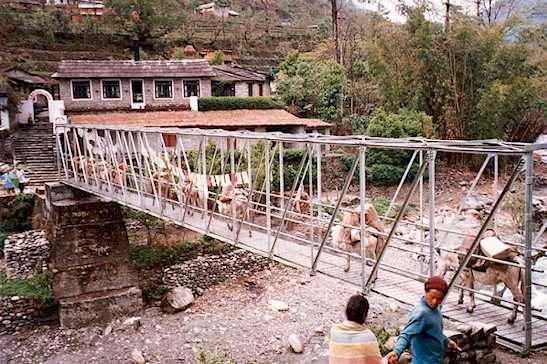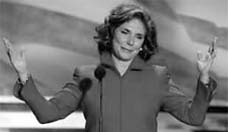
At a young age Robert Jolley served in the Peace Corps as a community organizer helping Nepali villagers
Robert Jolley
New kid at school
By Emily Zimmerman
At a young age Robert Jolley served in the Peace Corps as a community organizer helping Nepali villagers.
After years working in mental hospitals and other settings as a social worker, Jolley found his calling as a professor, helping students gain skills needed to survive in their careers.
For 25 years Jolley, 60, of Topsfield, Mass., was a professor of social work at University of New Hampshire in Durham. He now serves students in a new capacity, as interim dean of UNH-Manchester, replacing eight-year dean Karol LaCroix. Jolley had previously served as chair of the UNH Department of Social Work in Durham.
Jolley has a bachelorís degree from Allegheny College, a masterís degree from Boston University School of Social Work and a Ph.D. from Smith College School of Social Work.
How did you become involved in social work?
I spent two years in the Peace Corps after college and began working at the McLean Hospital at Boston University. I worked in the mental health setting at state hospitals and then went on to community mental health as a social worker. Then I went back to college for my Ph. D. I thought teaching would be an easy way to earn some money while I worked on my Ph. D. Little did I know it was a lot of work putting a course together and making assignments make sense. It really took a lot of time and energy and I got hooked.
Once you became a professor did you miss being a social worker?
I missed the direct contact with clients. Then when I became an administrator I missed the contact with students. But in administration I found new opportunities. As an administrator I was able to develop a masterís program 10 years ago in social work and now itís one of the largest graduate programs at UNH.
Has the transition from professor/department chair to interim dean been difficult?
Itís a new experience. I have had some familiarity with Manchesterís programs and worked with a number of people here before I came so thatís made things a bit easier. So far so good but this is only my first full week here. I am glad I knew some of the people here through the social work department. Itís not a totally new environment.
What are your responsibilities as interim dean?
I am in charge of hiring, scheduling, the financials. Itís only been three weeks so I am still learning about the process. Karol and her staff put together a five-year plan before I got here and that helps to have something as a guide and what to work on for the next year. A lot of good ideas have already come from the five-year plan and I hope to continue on thatósuch as strengthening current academic programs and addressing space needs.
Youíre interim dean now but would you want to take on the permanent job?
Of course there is potential interest. At this point, itís too early to make that decision. I am still getting my feet wet. Weíll have to see. UNH is going to do a national search for a new dean this semester and probably wrap up in the spring. The idea is for a new dean to start in 2005.
Do you like your job?
I am pleased to be here. I am looking forward to the challenges and opportunities of this position. I hope to learn more about Manchester. The school has a good reputation in the community and I hope I can make a contribution to that.
What does UNH offer as a downtown college?
Itís clear one of the differences between UNH-Manchester and UNH-Durham is that Manchester represents one of the largest urban communities in the state compared to Durham, which is relatively small. We have students here who are working full-time and need a close and flexible college. If a student isnít sure what they want to do, they try out a few courses. We are geographically pleasing. UNH provides everything any other liberal arts college offers, just closer to home and work.
What role does UNH play as a member of the Manchester community?
Manchester represents an urban campus and great opportunity for interaction with the community. We have greater diversity. UNH works with many businesses and organizations in the city. For example, the children at Parker Varney School come to UNH Manchester to see a college and learn what college is like. We have students participating in field internships and service projects in the city. Not only does it benefit the students in getting experience, but the businesses as well. We think about the impact we collectively have on the community. We certainly hope we are an asset to the community and that is clearly the goal.
Whatís more important, the fact that youíve got a bachelorís degree or name of the college?
The degree is more important than the name of the college on the diploma. There are differences between UNH-Manchester and Harvard, for example, but either way you are getting a good education. We are providing a higher education for students who wouldnít necessarily go to Harvard because they live and work here. For some jobs and to some people the college name on the diploma matters.
Do you think New Hampshire provides affordable education to all?
Affordability is a part of UNH-Manchester. Many Manchester institutions are affordable. But tuition is going up universally. There is some support to help students with college but I donít think there is enough. Tuition goes up as college operating costs go up. Itís important to find ways to keep education as affordable as possible. I donít think weíve solved the problem because need never matches what schools can award. I wish there was more support for education and financial aid in general.
Does a bachelorís degree still take you far and is a college degree still important for a career?
Itís increasingly important for people to have a college education. Twenty years ago you didnít need a college education to get a job. All you needed was a high school diploma and that was enough to do almost anything. A college education makes a difference in the long run for peopleís earning power, building a family and affording a home over a lifetime. It also contributes to the nationís economy. Higher education is making an increasing effort to reach out to as many constituents as possible with flexible hours and a variety of degrees. But I donít think the masterís degree will replace the bachelorís degree as a necessity for careers. Maybe in 50 years that may be the case but youíll always need a masterís for professions such as professor, doctor or lawyer.
What are some of your hobbies?
I enjoy doing a lot of outdoor activities like hiking, canoeing and gardening. I used to do a lot of gardening with my children. I do it whenever I get the opportunity. I like movies but never the ones that seem to win an Academy Award. I like reading. Murder mysteries mostly to bring up to our camp on Lake Chocorua in Tamworth. I also enjoy cooking but I am not sure that I am very good at it.
Tell me about your family.
My wife Cheryl and I have been married for 35 years. She is a middle school life sciences teacher in Topsfield. I have two adopted children from Colombia. Christina is 25 and Andrew is 22. They are both in college. Christina is at Salem State College in Salem, Mass. and Andrew is at Wentworth Institute of Technology.



